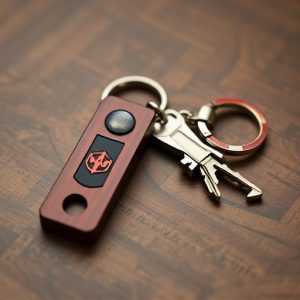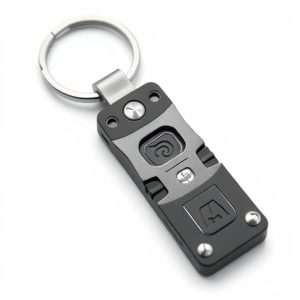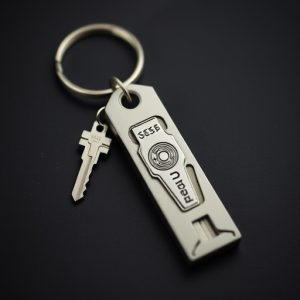Military-Grade Keychain Defense: Navigating Legal Requirements Globally
Personal safety enthusiasts seeking military-grade keychain defense tools must navigate varying lega…….
Personal safety enthusiasts seeking military-grade keychain defense tools must navigate varying legal landscapes. These tools, subject to strict regulations, differ in legality based on blade type, functionality, and regional gun control laws. Users should prioritize understanding local and regional legislation, ensuring compliance through ISO/CE certifications and reputable testing facilities. Investing in such tools offers superior protection with robust construction, but due diligence is crucial to avoid legal issues while prioritizing safety.
Staying safe while on the go is paramount, and military-grade keychain defense tools offer a compact solution. However, before investing, understand the legal frameworks surrounding these self-defense devices, as regulations vary widely by region. This article guides you through the intricacies of keychain safety device laws, from military-grade standards to regional variations. We provide a comprehensive checklist to ensure compliance and help you make an informed decision when choosing your personal defense tool.
- Understanding Legal Frameworks for Keychain Defense Tools
- Military-Grade Standards and Their Relevance
- Regional Variations in Legislation
- Ensuring Compliance: A Comprehensive Checklist
Understanding Legal Frameworks for Keychain Defense Tools
In the realm of personal safety, particularly when it comes to self-defense tools carried on keychains, understanding the legal frameworks is paramount. These tiny yet powerful devices, often referred to as military-grade keychain defense tools, are designed to provide individuals with a means of protection in various situations. However, their legality varies significantly across different regions and jurisdictions.
Many countries have specific regulations governing the carriage and use of self-defense tools, including those integrated into keychains. Factors such as length, blade type, and overall functionality play crucial roles in determining legal status. For instance, some regions permit only non-lethal options like pepper spray or alarm devices, while others allow more robust military-grade tools under certain conditions. It’s essential for users to familiarize themselves with local laws to ensure compliance and avoid any legal repercussions.
Military-Grade Standards and Their Relevance
Military-grade standards are often sought after when it comes to keychain defense tools, and for good reason. These tools are designed to meet the rigorous requirements set by military specifications, ensuring they can withstand extreme conditions and provide superior protection. The relevance of these standards lies in their ability to guarantee durability, reliability, and functionality under pressure.
When considering a keychain safety device, looking for products that adhere to military-grade quality ensures you’re investing in a tool that can offer reliable defense. Features like robust construction, corrosion resistance, and precise engineering ensure these keychains can protect against potential threats, providing peace of mind for users.
Regional Variations in Legislation
Regional variations in legislation play a significant role in determining the legality and availability of military-grade keychain defense tools. What’s permitted in one country or region may differ greatly from another, largely due to differing cultural perspectives on personal safety and firearms ownership. For instance, countries with strict gun control laws might have stringent regulations on self-defense tools like keychain knives or pepper spray, while regions with more liberal policies could allow a wider range of options.
Understanding these variations is crucial for individuals considering the purchase of military-grade keychain defense tools when traveling or relocating. Always check local and regional laws before acquiring such devices to ensure compliance and avoid any legal issues. This due diligence can help users protect themselves effectively while adhering to the specific regulations of their new environment.
Ensuring Compliance: A Comprehensive Checklist
Ensuring your keychain defense tool meets legal requirements is paramount for both consumer safety and compliance with regulatory standards. When considering military-grade keychain defense tools, a comprehensive checklist becomes essential to navigate the complex web of regulations. Start by verifying that the device aligns with industry-specific safety protocols, such as those set by relevant international standards (e.g., ISO, CE). These standards ensure basic safety requirements for consumer products, including materials used and mechanical properties.
Next, check if the keychain defense tool is compliant with local laws governing self-defense devices. Some regions have specific regulations regarding the legality of certain self-defense mechanisms, such as knife blades or pepper spray. Additionally, consider certifications from reputable testing facilities that validate the product’s effectiveness and safety, further assuring compliance with legal constraints. This step is crucial to avoid any potential legal repercussions and ensure your defense tool serves its intended purpose without compromising user safety.
When considering the legal requirements for keychain safety devices, it’s clear that military-grade standards offer a robust framework. These tools, designed with durability and reliability in mind, can provide users with peace of mind. However, regional variations in legislation demand a thorough understanding to ensure compliance. By utilizing a comprehensive checklist and staying informed about local laws, individuals can make informed choices when selecting keychain defense tools, prioritizing both personal safety and adherence to legal standards, especially those featuring military-grade quality.


